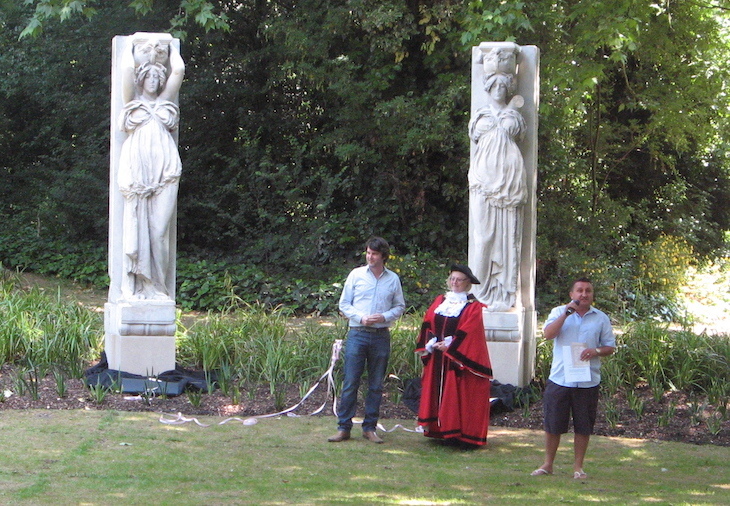
The stone statues that have moved twice around south London.
This pair of stoney maidens in Southwark Park might look sedate but, like Doctor Who's Weeping Angels, they move! Or rather, they have moved. Twice.
The duo began life outside Rotherhithe Town Hall, a late Victorian building that stood not far away on the corner of Neptune Road and Lower Road. Here it is in all its magnificence:

There's a special and lovely word for female statues that hold up bits of buildings: caryatids (sometimes caryatides). The most famous ones in London are the quartet along the side of St Pancras New Church on Euston Road (with four lesser-seen ones round the other side).
Their Southwark sisters were sculpted by Henry Poole. You might not know the name, but you've probably seen his work. This is the man who contributed most of the ornamentation to the magnificent Blackfriar pub near Blackfriars Bridge.
Rotherhithe Town Hall was badly damaged in the second world war and demolished shortly thereafter. But the caryatids lived on, standing guard over the site until the 70s. With their overburden destroyed, they had technically become mere statues, but since caryatid is such a fine word, let's continue to call them by that name.
In 1974 the old Town Hall site was earmarked for development. The caryatids had to leave their original home, but they didn't travel far. They were re-erected on the Heygate Estate near Elephant and Castle, about a mile away. Here they were displayed back-to-back, separated by a brick tower, thus:

And so they remained for another third of a century. Then, in 2009, the Heygate Estate was itself scheduled for demolition. Thousands of residents had to find new homes, and so too did the stone figures. Happily, the Friends of Southwark Park took the caryatids under their wing, and the sisters were re-erected in the park in 2011.

The local crusade to get the caryatids home
The move was spearheaded by Gary Magold, whom readers might remember from our feature on the Peek Frean Museum. "I remember the caryatids in situ as part of the ruined Rotherhithe Town Hall building as a child," Gary tells us. "They were sited in-between advertising hoardings opposite the old St Olaves Hospital, where I'd pop into the teas bar for a hot chocolate, on my way home from the then named 'Rotherhithe Swimming Baths'. They stuck out like sore thumbs as there was nothing like them in the locality, and I always thought they looked 'special'."

He was sorry to see them go, and didn't realise they'd been shifted to the Heygate until more than 30 years had passed. When the Heygate was due for demolition, Gary mounted a campaign to see their protection an rehoming.
"I started to speak to local councillors, and at Community Council meetings, telling Southwark what they actually had (as I think Southwark knew nothing about them) and how famous Henry Poole RA as a sculptor was. So I wrote a bid to Southwark Council's Cleaner, Greener, Safer Fund and managed to get funding to have them cleaned up, very lightly repaired and returned . Suddenly, the existing residents of the Heygate wanted them kept in their area, and a few articles began to appear in the Southwark News. To be fair the residents of Rotherhithe weren't consulted on their original removal, and they did belong to Rotherhithe. I even mocked up a photo showing what they'd look like in the park as part of my bid, which is just inside the old Borough of Rotherhithe area."
Eventually 'the ladies' made their rightful return. They were unveiled by the Mayor of Southwark, Councillor Lorraine Lauder, on Saturday 4 June 2011, at a public event.

And there, in Southwark Park, they remain today. You'll find the figures near the Jamaica Gate along the south-western edge of the park.
"Hopefully 'the ladies' will never move again as they look like they've been there for ever," adds Gary. " I still get that feeling (as I did as a child) of looking at something very special every time I pass by."
With grateful thanks to Gary Magold for his insightful comments and images.




